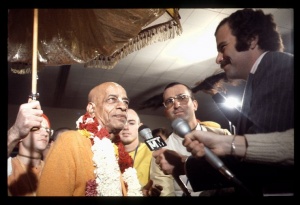SB 1.15.45: Difference between revisions
m (1 revision(s)) |
No edit summary |
||
| Line 1: | Line 1: | ||
{{info | {{info | ||
|speaker= | |speaker=Sūta Gosvāmī | ||
|listener=Sages of | |listener=Sages of Naimiṣāraṇya | ||
}} | }} | ||
[[Category:Srimad-Bhagavatam - Canto 01 Chapter 15]] | |||
[[Category:Bhagavatam Verses Spoken by Suta Gosvami - Vanisource|011545]] | |||
<div style="float:left">'''[[Srimad-Bhagavatam]] - [[SB 1|First Canto]] - [[SB 1.15: The Pandavas Retire Timely|Chapter 15: The Pāṇḍavas Retire Timely]]'''</div> | |||
<div style="float:right">[[File:Go-previous.png|link=SB 1.15.44]] '''[[SB 1.15.44]] - [[SB 1.15.46]]''' [[File:Go-next.png|link=SB 1.15.46]]</div> | |||
{{CompareVersions|SB|1.15.45|SB 1965|SB 1972-77}} | |||
{{RandomImage}} | |||
==== TEXT 45 ==== | ==== TEXT 45 ==== | ||
<div class="verse"> | |||
<div | :sarve tam anunirjagmur | ||
sarve tam anunirjagmur | :bhrātaraḥ kṛta-niścayāḥ | ||
bhrātaraḥ kṛta-niścayāḥ | :kalinādharma-mitreṇa | ||
kalinādharma-mitreṇa | :dṛṣṭvā spṛṣṭāḥ prajā bhuvi | ||
dṛṣṭvā spṛṣṭāḥ prajā bhuvi | |||
</div> | </div> | ||
| Line 18: | Line 23: | ||
==== SYNONYMS ==== | ==== SYNONYMS ==== | ||
<div class="synonyms"> | |||
<div | ''sarve''—all his younger brothers; ''tam''—him; ''anunirjagmuḥ''—left home by following the elder; ''bhrātaraḥ''—brothers; ''kṛta-niścayāḥ''—decidedly; ''kalinā''—by the age of Kali; ''adharma''—principle of irreligion; ''mitreṇa''—by the friend; ''dṛṣṭvā''—observing; ''spṛṣṭāḥ''—having overtaken; ''prajāḥ''—all citizens; ''bhuvi''—on the earth. | ||
</div> | </div> | ||
| Line 26: | Line 30: | ||
==== TRANSLATION ==== | ==== TRANSLATION ==== | ||
<div class="translation"> | |||
<div | |||
The younger brothers of Mahārāja Yudhiṣṭhira observed that the age of Kali had already arrived throughout the world and that the citizens of the kingdom were already affected by irreligious practice. Therefore they decided to follow in the footsteps of their elder brother. | The younger brothers of Mahārāja Yudhiṣṭhira observed that the age of Kali had already arrived throughout the world and that the citizens of the kingdom were already affected by irreligious practice. Therefore they decided to follow in the footsteps of their elder brother. | ||
</div> | </div> | ||
| Line 34: | Line 37: | ||
==== PURPORT ==== | ==== PURPORT ==== | ||
<div class="purport"> | |||
The younger brothers of Mahārāja Yudhiṣṭhira were already obedient followers of the great Emperor, and they had sufficiently been trained to know the ultimate goal of life. They therefore decidedly followed their eldest brother in rendering devotional service to Lord Śrī Kṛṣṇa. According to the principles of ''sanātana-dharma'', one must retire from family life after half the duration of life is finished and must engage himself in self-realization. But the question of engaging oneself is not always decided. Sometimes retired men are bewildered about how to engage themselves for the last days of life. Here is a decision by authorities like the Pāṇḍavas. All of them engaged themselves in favorably culturing the devotional service of the Lord Śrī Kṛṣṇa, the Supreme Personality of Godhead. According to Svāmī Śrīdhara, ''dharma'', ''artha'', ''kāma'' and ''mokṣa'', or fruitive activities, philosophical speculations and salvation, as conceived by several persons, are not the ultimate goal of life. They are more or less practiced by persons who have no information of the ultimate goal of life. The ultimate goal of life is already indicated by the Lord Himself in the [[Bhagavad-gita As It Is (1972)|''Bhagavad-gītā'']] ([[BG 18.64 (1972)|BG 18.64]]), and the Pāṇḍavas were intelligent enough to follow it without hesitation. | |||
</div> | |||
<div | |||
<div style="float:right; clear:both;">[[File:Go-previous.png|link=SB 1.15.44]] '''[[SB 1.15.44]] - [[SB 1.15.46]]''' [[File:Go-next.png|link=SB 1.15.46]]</div> | |||
</div> | __NOTOC__ | ||
__NOTOC__ | __NOEDITSECTION__ | ||
Revision as of 09:34, 2 May 2021

A.C. Bhaktivedanta Swami Prabhupada
TEXT 45
- sarve tam anunirjagmur
- bhrātaraḥ kṛta-niścayāḥ
- kalinādharma-mitreṇa
- dṛṣṭvā spṛṣṭāḥ prajā bhuvi
SYNONYMS
sarve—all his younger brothers; tam—him; anunirjagmuḥ—left home by following the elder; bhrātaraḥ—brothers; kṛta-niścayāḥ—decidedly; kalinā—by the age of Kali; adharma—principle of irreligion; mitreṇa—by the friend; dṛṣṭvā—observing; spṛṣṭāḥ—having overtaken; prajāḥ—all citizens; bhuvi—on the earth.
TRANSLATION
The younger brothers of Mahārāja Yudhiṣṭhira observed that the age of Kali had already arrived throughout the world and that the citizens of the kingdom were already affected by irreligious practice. Therefore they decided to follow in the footsteps of their elder brother.
PURPORT
The younger brothers of Mahārāja Yudhiṣṭhira were already obedient followers of the great Emperor, and they had sufficiently been trained to know the ultimate goal of life. They therefore decidedly followed their eldest brother in rendering devotional service to Lord Śrī Kṛṣṇa. According to the principles of sanātana-dharma, one must retire from family life after half the duration of life is finished and must engage himself in self-realization. But the question of engaging oneself is not always decided. Sometimes retired men are bewildered about how to engage themselves for the last days of life. Here is a decision by authorities like the Pāṇḍavas. All of them engaged themselves in favorably culturing the devotional service of the Lord Śrī Kṛṣṇa, the Supreme Personality of Godhead. According to Svāmī Śrīdhara, dharma, artha, kāma and mokṣa, or fruitive activities, philosophical speculations and salvation, as conceived by several persons, are not the ultimate goal of life. They are more or less practiced by persons who have no information of the ultimate goal of life. The ultimate goal of life is already indicated by the Lord Himself in the Bhagavad-gītā (BG 18.64), and the Pāṇḍavas were intelligent enough to follow it without hesitation.